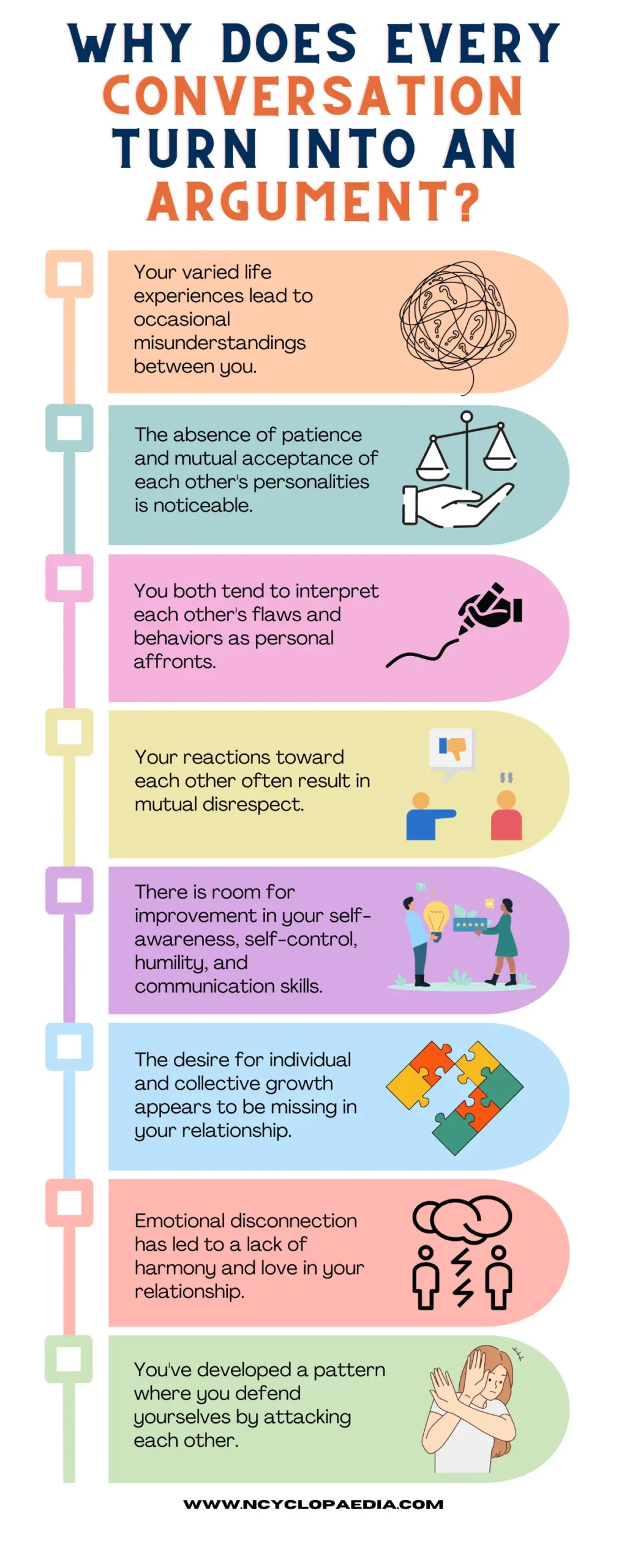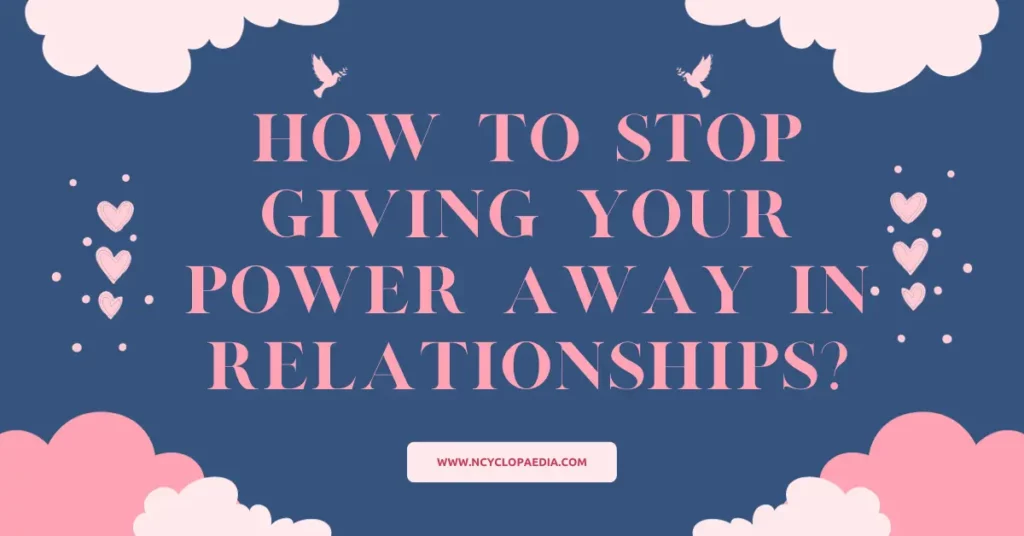When conversations consistently devolve into heated arguments, it becomes evident that the standards within your relationship have taken a hit. Over time, you’ve conditioned yourselves to react to each other’s opinions with ego and pride.
This reactive behavior only fuels the flames, making it challenging to resolve disagreements in the peaceful and loving manner that healthy couples strive for.

Failure to break free from this habit of impulsive reactions may lead to one or both partners harboring resentment and losing feelings of respect and care. Typically, the individual who feels the most victimized and possesses the least patience and respect becomes the harbinger of discord.
The root cause of this recurrent argumentative cycle is often a failure to establish or uphold healthy boundaries within the relationship. Instead of coming to an agreement about what’s acceptable in terms of communication and behavior, you’ve engaged in ongoing disputes, defending your beliefs rather than listening and acknowledging that you might be mistaken, and that it’s perfectly fine to be wrong.
In all types of relationships—be it romantic, friendship, or family bonds—there must be boundaries that cannot be crossed. For instance, physical harm should never be inflicted upon another person, as doing so breaches the fundamental threshold of what is acceptable and potentially encourages your partner to follow suit.

Humans are naturally reactive beings, and if you consistently display indifference and a poor approach to problem-solving, you’ll cause harm and drag your partner down to a lower level of maturity. Over time, unresolved issues can fester, leading to bitterness or even contempt.
The power to prevent your relationship from descending into chaos rests with both you and your partner. You have the ability to nurture a healthy relationship, but achieving this requires self-awareness and a genuine desire for a harmonious partnership.
Establishing boundaries is the relatively straightforward part of the equation. The real challenge lies in adhering to those boundaries when emotions run high. Refraining from emotional reactions demands both emotional self-control and a healthy perspective on your partner.
You might successfully control your temper dozens of times, but if you continue to view your partner as the source of all problems while considering yourself the victim, nothing will change. Your thinking patterns will remain stagnant, leading you to eventually slip back into the habit of arguing whenever conflicts arise.
The key to ending these recurrent arguments lies in altering your perception of your partner’s opinions, beliefs, attitudes, mistakes, behavior, and personality. It’s imperative to accept your partner for who they are. When this acceptance is genuine, you won’t need to constantly control your anger during conversations because there won’t be any anger to begin with.
This is the distinction between simply tolerating things and authentically accepting them.
Don’t merely focus on mastering emotional control; while emotional outbursts may be wreaking havoc on your relationship, there’s a deeper issue at play that demands attention—your thought processes and how you perceive your partner.
Your mindset must evolve, enabling you to reprogram your thinking patterns and, in turn, your reactions when faced with situations where you feel unheard, disrespected, or threatened.
Your partner, too, needs to embark on a similar journey. They must recognize the significance of engaging in healthier disagreements, enhancing their perception, learning to de-escalate tensions, and ceasing impulsive reactions.
While it may take time, with determination and a clear understanding of what’s at stake, you and your partner possess the tools needed to break free from unhealthy patterns and save your relationship from crumbling.
In this article, we delve into the implications of frequent arguments in a relationship and offer guidance on how to steer conversations away from becoming battlegrounds.
Understanding the Escalation of Every Conversation into an Argument
Differing opinions and beliefs are a natural part of any relationship, signifying that both individuals are unique in their own life experiences. However, what isn’t healthy is allowing these disagreements to consistently escalate into heated arguments every time you express your viewpoints.
Engaging in these arguments can have a detrimental impact on your relationship, leading to emotional disconnection and vulnerability to doubts, fears, and temptations to seek solace in the company of others. Prolonged arguing can erode your relationship from within and often culminate in a painful breakup.
If you’re committed to preserving your relationship, it’s essential to recognize that the most critical skill you lack is effective communication. Without it, your relationship will remain unfulfilling and may not withstand the test of time.

Despite moments of joy that may sporadically punctuate your relationship, they will not suffice to counterbalance the negative impact of ongoing conflicts. It is how you navigate these conflicts, stressors, and various relationship challenges that will ultimately determine the success and happiness of your relationship.
Hence, it is crucial to prioritize the improvement of communication, self-awareness, emotional self-control, and a shared commitment to personal growth in order to create a solid foundation for your relationship.
The level of seriousness with which you address these shortcomings will determine whether your relationship flourishes, stagnates, or ultimately dissolves. Communication, in particular, stands out as the most pivotal skill. Neglecting to hone this skill will not lead to miraculous improvements in your relationship.
As people age, they naturally evolve, but substantial change only occurs when they consciously choose to break free from ingrained patterns of behavior and thought. Growth ensues when individuals acknowledge their flaws and embark on a journey of self-improvement, which often requires weeks or even months of dedicated effort to transform deeply rooted beliefs.
So, if you’re wondering why every conversation in your relationship spirals into an argument, consider that you may be fundamentally different individuals due to distinct backgrounds or life lessons, you might not have invested enough in personal growth before entering the relationship, or emotional disconnection might have set in over time.

Emotional disconnection often leads to distorted perceptions, lowered relationship standards, and the development of defense mechanisms and unhealthy response patterns to relationship challenges. Rather than resolving issues, both partners react defensively and perpetuate conflict.

Similar to how physical muscles require training, emotional intelligence, self-awareness, morality, and empathy are qualities that need cultivation. We aren’t born with these skills, and simply desiring a successful relationship isn’t enough; active effort and commitment are essential.
Relationships demand maturity, and without it, destructive behaviors are likely to emerge, leading to unhappiness and suffering. Arguments become a default mode of problem-solving when emotions take control, causing partners to react impulsively.
Remember that most relationships don’t crumble due to disagreements on major life issues like children, marriage, finances, or goals. Instead, they erode because of frequent, inconsequential disputes—such as arguments over household chores—resulting from poor communication and problem-solving skills.
These disputes create emotional distance and can breed exhaustion, ingratitude, bitterness, or even vindictiveness, depending on how partners perceive each other and their respective victimization levels.
Why Do Exes Argue Every Time They Communicate?
Ex-partners often engage in arguments each time they interact because they harbor different perspectives and post-breakup expectations. The emotional distance following a breakup can lead to feelings of rejection and suffocation, heightening unprocessed emotions and exacerbating conflicts.
Some exes resort to yelling and hurling accusations at each other, while others opt for complete avoidance. The nature of their interactions depends on the circumstances of the breakup and their current emotional reliance on each other. Bitter memories and negative associations tend to resurface in these exchanges.
During the early stages of a breakup, individuals require time to process their feelings of hurt and the need for personal space. It’s essential to respect these emotional needs to pave the way for healthier interactions in the future.
Cultivating Healthy Conversations in Relationships
Just as you weren’t born with a chiseled physique, your natural inclination may not be to excel in romantic relationships. Many vital relationship skills must be cultivated through introspection and a willingness to acknowledge and rectify your mistakes.
To embark on this journey, start by recognizing your shortcomings and commit to addressing them. Write down your mistakes, exploring the emotions and motivations that led to them. This process helps you understand why you acted impulsively.

Genuine change requires not only a desire for a happy and successful relationship but also a compelling need for personal growth. The urgency to change often arises from the realization that failing to do so will lead to suffering and a breakup.
Recognize that you have the power to avoid this suffering, but it demands concerted effort and a sense of urgency. Change won’t happen overnight, but with dedication, you can alter your thought patterns and emotional reactions.
Most changes necessitate individual work on both partners’ parts. You must gain control over your thoughts and emotions to become less reactive and better equipped to handle relationship challenges.
Work on fostering a healthy mindset and eliminating resentment towards each other. Once you’ve laid this groundwork, you can begin discussing crucial relationship aspects, including mutual forgiveness, gratitude, triggers, and improved communication techniques to avoid arguments in the future.
Engage in open conversations to address flaws in your relationship and express concerns. This process helps elevate relationship standards, strengthen your connection, and prevent conversations from escalating into arguments.

While altering your perceptions, controlling impulsive reactions, and accepting each other’s imperfections may pose challenges, the rewards are well worth the effort. In doing so, you’ll grow as individuals and as romantic partners, recognizing that successful relationships require two emotionally invested and developed individuals who share the responsibility for maintaining relationship standards and sustaining love.


























































































































